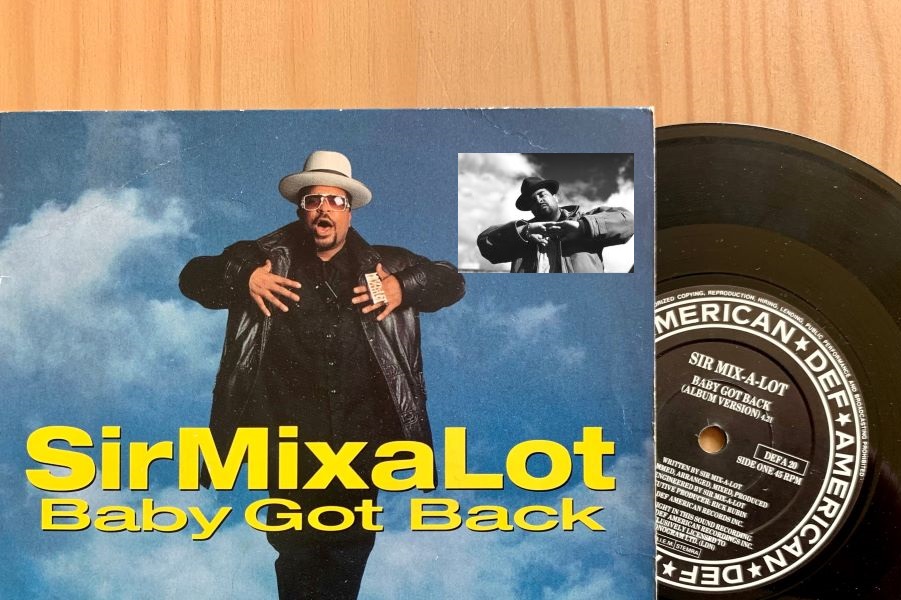“OMG—Becky, Look at Her …” What?!?
It is scarcely the first ditty about derrieres ever recorded. Queen rocked the airwaves with “Fat Bottomed Girls” in 1978. K.C. and the Sunshine Band’s “Shake Your Booty,” released two years prior, hit No. 1 on the Billboard Top 100 and R&B Charts. And Experience Unlimited’s 1988 dance-move tune, “Da’ Butt,” was nominated for a Grammy Award for Best R&B Performance by a Duo or Group with Vocals.
But there was something about Sir Mix-A-Lot’s “Baby Got Back,” a pulsating, high-energy, lyrically suggestive hit from 1992, that elicits a range of responses from listeners. When it played in clubs back in the day, “Baby Got Back,” prompted most folks to take to the dance floor, yet others would take umbrage. The song was both No. 1 on the Billboard Hot 100 chart and briefly banned from being aired on MTV before 9 p.m. It earned Sir Mix-a-Lot a Grammy Award yet prompted him to engage in discussions about the lyrics with women on a college campus who threatened a boycott of one of his concerts.
To this day, Sir Mix-A-Lot has explained that the song is an ode to Black women, whose curvaceous bodies have been historically mocked and maligned dating back at least to Europe’s initial invasions of Africa. Among the most infamous Black women subjected to inhumane treatment for her voluptuous frame was Sarah Baartman, a South African woman lured to Europe in the early 1800s under false pretenses then paraded around Paris and London as part of a freak show that drew crowds of people eager to stare at her large, round buttocks.
From the look of things today, however, it appears that the song Sir Mix-A-Lot penned as a celebration of Black beauty might have been a precursor of preferences to come. A body shape that has always been the standard of beauty in the Black community has now gone mainstream, with plastic surgeons, fitness trainers and social media influencers all promoting the bubbly backside.
Sir Mix-A-Lot has performed his signature hit everywhere from the Arsenio Hall Show in 1992 to Benaroya Hall with the Seattle Symphony in 2014. On June 1, he will perform as the main music attraction for United Way of King County’s Eat, Drink & Be Generous event at the Paramount Theatre. The event also features food from nine of the area’s most popular restaurants. Event proceeds go toward ensuring everyone has a safe place to call home, enough to eat and a job that pays a livable wage. United Way sat down recently with Sir Mix-A-Lot to chat about the chart-topping tune and about performing locally.
United Way of King County: So, MTV banned, “Baby Got Back.”
Sir Mix-A-Lot: And keep in mind, it was the number one video on MTV and number one on the Billboard chart. They said, “We’re only going to play it after 9 p.m.” I’m going to tell you what happened, and this maybe happenstance, I doubt it. Somebody asked me what “Baby Got Back” was about. My response went national; it ended up in big magazines. And when I told them what it was about—it was about African American beauty, and how two things are happening, that one it’s getting copied, and two it’s getting ridiculed at the same time.
So, I wanted to talk about my sisters, they are absolutely gorgeous, stay the way you are. I didn’t like the blond weaves. I never liked them. Who are you trying to be?
Sir Mix-A-Lot (continued): That’s what “Baby Got Back” was really about: Give me a sista, I can’t resist her. Red beans and rice didn’t miss her. I wanted pure culture. I wanted you to be as Black as you could possibly be. I wasn’t knocking anybody, [including] any white girl at all. That’s what I did. And when I told that story, that song was banned within a week.
United Way of King County: To this day, there are people who hear that song, and that interpretation is the last thing they’d think.
Sir Mix-A-Lot: A lot of people thought it was just a butt song, and that’s not what it was. I’m like, “Listen to the song closely.” And the way I did the video, I told that story, and probably contributed even more so [to the banning]. In my past songs, when I talked about women I objectified them, so what I do hanging out with them? In “Baby Got Back,” I never touch them. I’m looking up to them. She’s on a pedestal. Through the whole video they can’t reach her. The two white girls are knocking her. “Oh my God, Becky …,” they can’t reach her. Nobody was on that platform but her, and I’m trying to get to her, but she’s like, “No, it ain’t gonna happen.” All of that was really subtle. But when I said it, maybe it’s just happenstance, maybe there were that many people offended. It didn’t seem like that at my shows. But MTV said that there were complaints.

Sir Mix-A-Lot (continued): The reason I did “Baby Got Back” was that it came to me while watching television. I was watching The Cosby Show, and said, “This is really cool, a sista who is a professional.” What was happening before that, and I started looking at all those old shows, and you were either a maid or, in the case of Good Times, a former maid. And that’s all you were, or a streetwise hooker who gave the detectives information. That’s all they had for Black women on TV. That was all you saw.
But when you live in the ‘hood, you see strong sistas every day. But you never hear about it. That’s why when I did, “Baby Got Back,” I made sure she was greater than me. And when we got there [to the video shoot], they had the girls dressed all wrong, in tiger-printed shorts, really tight with crazy hair. I’m like, “No, this is not what I’m looking for.” I asked the woman in the video, “Why are you wearing this?” She said, “They told me this is what you wanted.” I said, “What? No.” And I cursed out the whole crew.
One woman said, “Would you sing this in front of your mama?” And I said, “Well, I have! And she didn’t get mad.”
Sir Mix-A-Lot, when asked about “Baby Got Back” during a college campus interview.
United Way of King County: When “Baby Got Back” charted, what was the response from Black women, and what is the response now?
Sir Mix-A-Lot: This is interesting: The response was good for the most part. But there was one college, I believe it was in Nebraska, and the women wanted to boycott the show because they said I was objectifying women. I talked to a radio station and I told the station, “Get some of the women on and let’s talk live. They can come at me as hard as they want to, because I’m going to be genuine.” We started to do that. And their argument was, “You’re objectifying us in the name of sistas.” I’m like, “No.” I’m the [harlot] in the song. I’m trying to objectify you, but if you listen to the lyrics, I never get to you. That’s the whole idea of the song. They looked at the video and thought about it, they didn’t necessarily like it, but they didn’t boycott it.
And I wanted the back and forth to go public. And there were some hard questions. One woman said, “Would you sing this in front of your mama?” And I said, “Well, I have! And she didn’t get mad.” And in retrospect, I think people get what it’s about. They really do. Then I had a friend who didn’t want me to allow Nicki Minaj to use it in her song, “Anaconda.” He said, “She’s taking away from what the song is really about.” And I said, “She’s an example that the song worked, of African American beauty being accepted.”
United Way of King County: Did you change the lyrics at all before the finished product?
Sir Mix-A-Lot: No, I just didn’t want to cuss in it, because that would have been low-hanging fruit, that would have been corny.
United Way of King County: But now there’s the video on YouTube of you performing “Baby Got Back” with the Seattle Symphony.
Sir Mix-A-Lot: Everybody thinks that was staged. That was not staged. I was terrified. Because of the orchestra, they’re polished musicians. They don’t waste time practicing. They just look at sheet music. So, I said, “I need a run through,” and they sent me a recording they made. That’s all I had to go by. And so, it’s just me and my guys and we look out and the first thing we see is a woman, very snobby, looking at sheet music, going along with it, and I’m like, “Oh my God, what are we about to do.”
And when we started, she was one of the first ones on stage. It blew my mind. I always feel like the things that happen organically leave traces. The things that are planned, you can sniff them out immediately.


Comments